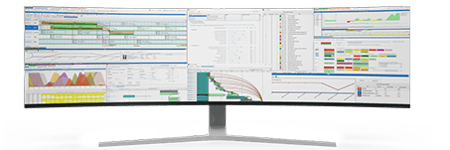Implementing IoT in Medical Manufacturing: A Turning Point for Production Scheduling
The medical manufacturing industry is facing constant pressure to enhance production efficiency while maintaining the highest standards of quality and safety. In this landscape, Production Schedulers play a critical role in ensuring that resources, personnel, and equipment are effectively coordinated to meet production targets without compromising on regulatory compliance or product quality.
The advent of the Internet of Things (IoT) offers new opportunities for optimizing production scheduling in medical manufacturing. By enabling machines, sensors, and software to communicate and share data in real time, IoT brings a transformative shift in how manufacturing operations are planned and executed. For Production Schedulers, the integration of IoT with advanced planning and scheduling (APS) software like PlanetTogether, in conjunction with enterprise systems like SAP, Oracle, Microsoft, Kinaxis, or Aveva, can provide a new level of insight, control, and flexibility.
In this blog, we will explore the benefits of implementing IoT in medical manufacturing, its impact on production scheduling, and how integrating IoT-enabled data with systems like PlanetTogether can create a seamless, highly efficient production environment.

The Role of IoT in Medical Manufacturing
IoT in manufacturing refers to the integration of devices, sensors, and machines that communicate through the internet to collect and exchange real-time data. In medical manufacturing, IoT devices can be embedded in production equipment, monitoring systems, and even packaging machines to capture data that can drive better decision-making.

Key Applications of IoT in Medical Manufacturing
Real-Time Equipment Monitoring: IoT sensors can monitor the performance, temperature, and operational status of critical manufacturing equipment, ensuring they function within the prescribed parameters. Any deviation can trigger immediate alerts, preventing potential breakdowns or production delays.
Predictive Maintenance: By continuously collecting data on machine performance, IoT can enable predictive maintenance. This reduces the likelihood of equipment failures, as maintenance can be scheduled based on actual machine conditions rather than predefined intervals.
Quality Assurance and Traceability: IoT devices can track raw materials, production conditions, and the movement of products through the entire manufacturing process. This ensures that all products meet strict regulatory standards and allows for end-to-end traceability, which is crucial in a highly regulated industry like medical manufacturing.
Inventory and Supply Chain Management: By tracking inventory levels and the movement of materials in real-time, IoT helps ensure that raw materials are available when needed, preventing production stoppages due to stockouts. Additionally, IoT can provide insight into supplier performance and material quality.
Automation of Production Processes: IoT can facilitate greater automation in production processes by integrating with robotics and other automated systems. This increases the consistency and accuracy of production runs, which is vital for the quality of medical devices and pharmaceutical products.

The Impact of IoT on Production Scheduling
The integration of IoT into medical manufacturing transforms how Production Schedulers manage their operations. Traditionally, scheduling relied heavily on historical data, predefined schedules, and the intuition of experienced schedulers. However, IoT introduces real-time data into the equation, providing Production Schedulers with up-to-the-minute information on machine performance, material availability, and production conditions.
Here’s how IoT impacts production scheduling:
Dynamic Scheduling: IoT enables real-time visibility into production line performance, allowing schedulers to make adjustments based on current conditions. If a machine goes down or a material is delayed, the scheduler can immediately reschedule tasks, minimizing downtime.
Increased Flexibility: With IoT, Production Schedulers can respond to changes in demand or unexpected events more quickly. For example, if a new order comes in that requires a product changeover, IoT-enabled systems can provide real-time data on equipment availability, material readiness, and labor capacity, allowing the scheduler to adjust the production plan accordingly.
Enhanced Forecast Accuracy: IoT data can improve the accuracy of demand forecasting by providing detailed insights into production capabilities and constraints. This helps schedulers plan for future orders with greater precision, ensuring that the necessary resources will be available when needed.
Optimized Resource Utilization: IoT data allows for better tracking of machine utilization, labor efficiency, and material usage. This enables Production Schedulers to optimize resource allocation, reducing waste and improving overall production efficiency.
Proactive Problem Solving: IoT can help Production Schedulers anticipate issues before they become major problems. For example, predictive maintenance data can alert schedulers to potential machine failures, allowing them to adjust the schedule to accommodate repairs without disrupting the overall production flow.


Integrating IoT with PlanetTogether for Smarter Scheduling
While IoT provides the raw data needed to optimize production, the real power of this technology is unlocked when it is integrated with advanced planning and scheduling software like PlanetTogether. PlanetTogether is designed to manage complex production environments by optimizing schedules, balancing resources, and ensuring that production targets are met efficiently.
By integrating IoT data with PlanetTogether, medical manufacturers can achieve a higher level of scheduling accuracy and flexibility. This integration allows for the real-time adjustment of production schedules based on actual shop floor conditions, improving efficiency and reducing the risk of production delays.
Benefits of IoT-PlanetTogether Integration
Real-Time Data Feed: With IoT devices feeding real-time data into PlanetTogether, schedulers can monitor production progress in real-time and make immediate adjustments to the schedule when needed. This real-time feedback loop reduces the reliance on static, outdated schedules and allows for more dynamic and responsive planning.
Automated Decision-Making: PlanetTogether’s scheduling algorithms can automatically adjust production plans based on IoT data. For example, if IoT sensors detect a drop in machine efficiency, PlanetTogether can automatically reschedule tasks to other available machines, minimizing downtime and ensuring that production targets are met.
Improved Collaboration Across Systems: PlanetTogether can integrate with major enterprise systems like SAP, Oracle, Microsoft, Kinaxis, and Aveva, creating a seamless flow of information between the shop floor and the broader enterprise. This ensures that IoT data is not only used for production scheduling but also informs decisions related to procurement, supply chain management, and financial planning.
Enhanced Predictive Analytics: The combination of IoT data and PlanetTogether’s advanced analytics capabilities allows for better predictive scheduling. Schedulers can anticipate bottlenecks, material shortages, or equipment failures before they occur, enabling proactive decision-making that prevents disruptions.
Regulatory Compliance and Traceability: In medical manufacturing, regulatory compliance is a critical concern. IoT devices can provide detailed traceability data for every batch, machine, and material used in the production process. By integrating this data with PlanetTogether, manufacturers can ensure that every product meets regulatory standards and that any deviations are immediately flagged and addressed.
The integration of IoT into medical manufacturing offers Production Schedulers unprecedented opportunities to optimize their operations. By providing real-time data on equipment performance, material availability, and production conditions, IoT allows schedulers to make more informed decisions, reduce downtime, and improve overall efficiency.
When combined with advanced scheduling tools like PlanetTogether and integrated with enterprise systems like SAP, Oracle, Microsoft, Kinaxis, or Aveva, IoT becomes a powerful enabler of smarter, more agile production scheduling. For medical manufacturers, this can lead to improved product quality, regulatory compliance, and customer satisfaction, positioning the facility for long-term success in an increasingly competitive market.
As medical manufacturing becomes more complex and global, the role of the Production Scheduler will evolve. Schedulers who embrace IoT and its integration with APS systems like PlanetTogether will find themselves at the forefront of this transformation, using real-time data to drive better outcomes and more efficient production processes. This evolution not only enhances the ability to meet production goals but also ensures the facility can quickly adapt to new challenges, from supply chain disruptions to regulatory changes.
Are you ready to take your manufacturing operations to the next level? Contact us today to learn more about how PlanetTogether can help you achieve your goals and drive success in your industry.



